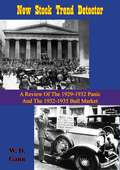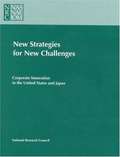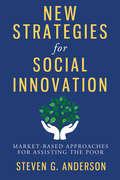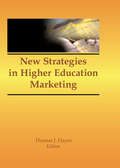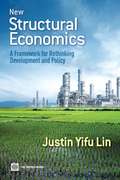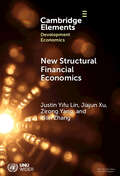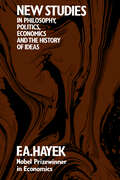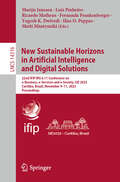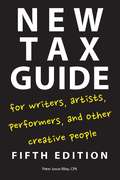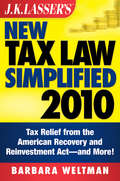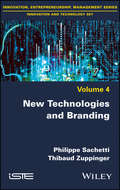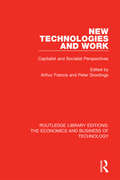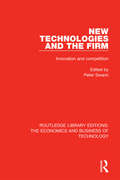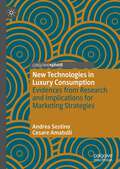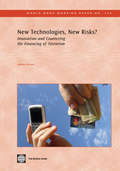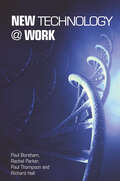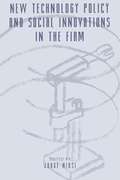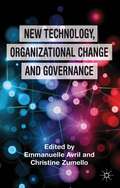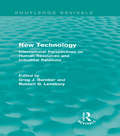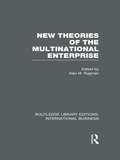- Table View
- List View
New Stock Trend Detector: A Review Of The 1929-1932 Panic And The 1932-1935 Bull Market
by W. D. GannWhen I wrote TRUTH OF THE STOCK TAPE in 1923, it was because there was a demand for a book of that kind. People needed the help that I could give them and the benefit of my experience and knowledge. In that book I gave the best I had and received my reward. People appreciated my efforts. They bought the book then and they are still buying it. They say it is a good book and more than worth the money. That is very gratifying to me.After the 1929 bull market culminated there was a demand for a new book to meet changed conditions under the so-called "New Era," so I wrote WALL STREET STOCK SELECTOR in the spring of 1930. I gave freely of my knowledge and the benefit of years of experience. This book helped others to protect their principal and make profits. People who read the book pronounced it one of the best. It is still selling, and again I have been rewarded.No man can learn all there is to know about forecasting the trend of stocks in 3, 5, 10, or 20 years, but if he is a deep student and hard worker, he learns more and knowledge comes easier after years of experience. I knew more about determining the trend of stocks in 1923 than I did in 1911. Seven more years of experience gave me more knowledge and enabled me to write the WALL STREET STOCK SELECTOR in 1930 and give my readers the benefit of my increased knowledge. Now, after five more years have elapsed, my experience and practical test of new rules have enabled me to learn more of value since 1930. The 1929-1932 panic and what has followed since, gave me valuable experience and I have gained more knowledge about detecting the right stocks to buy and sell. I cannot lose if I pass this knowledge on to those who will appreciate it.
New Strategies for New Challenges: Report of a Joint Task Force of the National Research Council and the Japan Society for the Promotion of Science
by Committee on JapanThe National Academies Press (NAP)--publisher for the National Academies--publishes more than 200 books a year offering the most authoritative views, definitive information, and groundbreaking recommendations on a wide range of topics in science, engineering, and health. Our books are unique in that they are authored by the nation's leading experts in every scientific field.
New Strategies for Social Innovation
by Steven G AndersonThis book is the first to assess emerging market-based social change approaches comparatively, focusing specifically on social entrepreneurship, corporate social responsibility, fair trade, and private sustainable development
New Strategies for Social Innovation: Market-Based Approaches for Assisting the Poor
by Anderson Steven G.This book is the first to assess emerging market-based social change approaches comparatively, focusing specifically on social entrepreneurship, corporate social responsibility, fair trade, and private sustainable development
New Strategies for Social Innovation: Market-Based Approaches for Assisting the Poor
by Steven AndersonMarket-based development strategies designed to help the world's poor receive significant support from advocates, academics, governments, and the media, yet frequently the perceived success of these programs rests on carefully selected examples and one-sided, enthusiastic accounts. In practice, these approaches are often poorly defined and executed, with little balanced, comparative analysis of their true strengths and weaknesses.This book is the first to assess emerging market-based social change approaches comparatively, focusing specifically on social entrepreneurship, corporate social responsibility, fair trade, and private sustainable development. Steven G. Anderson begins by identifying the problems these programs address and then describes their core, shared principles. He follows with a general framework for defining and evaluating these and other development approaches. Separate chapters provide background on the historical development and application of each approach, as well as interpretations of the processes for implementation and the underlying behavioral assumptions related to successful outcomes. A final chapter compares each approach across a set of important program development dimensions and analyzes the utility of market-based approaches as part of a general consideration of social development strategies for the developing world.
New Strategies in Higher Education Marketing
by James A Burns Thomas J HayesWith rising financial difficulties and declining enrollments, many colleges and universities are finding that they need new and better ways to present and promote themselves to potential students and the general public. New Strategies in Higher Education Marketing contains practical, “how-to” applications of marketing thought and theory for the higher education environment. Written by practitioners for practitioners, this valuable book offers new viewpoints, tools, and creative ways to solve potentially devastating problems through the implementation of marketing. Each chapter is application oriented and cases and situations common to most universities and colleges are discussed to illustrate marketing strategies and techniques to make them more easily understood and readily usable.New Strategies in Higher Education Marketing is divided into four sections: Strategy Research and Promotion Enrollment Services Development. It includes informative chapters on topics including perceptions and proper application of marketing in higher education; fund raising; public relations; coordination of intra-organizational efforts; techniques and methods of gathering information and data; and the challenge and management of student enrollment. Directors, presidents, vice-presidents, and others responsible for or interested in the marketing of a college or university will find a wealth of highly practical information in this book.
New Structural Economics
by Justin Yifu LinEconomic development is a process of continuous technological innovation and structural transformation. Development thinking is inherently tied to the quest for sustainable growth strategies. This book provides a neoclassical approach for studying the determinants of economic structure and its transformation and draws new insights for development policy. The market is the basic mechanism for effective resource allocation at each level of development. However, economic development as a dynamic process entails structural changes, including industrial upgrading and diversification and corresponding improvements in hard and soft infrastructure. Such upgrading and improvements require coordination and go hand in hand with large externalities to firms' transaction costs and returns to capital investment. Thus, in addition to an effective market mechanism, the government should play an active role in facilitating structural changes. The book provides empirical evidence in support of this framework as well as concrete advice to development practitioners.
New Structural Financial Economics: A Framework for Rethinking the Role of Finance in Serving the Real Economy (Elements in Development Economics)
by Justin Yifu Lin Jiajun Xu Zirong Yang Yilin ZhangThis Element proposes an alternative framework for rethinking the role of finance in serving the real economy from the perspective of New Structural Financial Economics. It challenges the conventional wisdom that developing countries should take the financial structure of developed countries as the benchmark and financial structure does not matter in spurring long-run economic development. As a sub-discipline of New Structural Economics, New Structural Financial Economics has three tenets. First, examining the appropriate financial structure should take an economy's factor endowment structure as the starting point of analysis, which identifies its latent comparative advantage. Second, the appropriate financial structure is determined by the financing needs of the prevailing production structure. Third, a government should provide development financing to address market failures, and make tailored financial regulations in line with the characteristics of specific financial arrangements. This title is also available as Open Access on Cambridge Core.
New Studies in European History: Export Empire
by Stephen G. GrossGerman imperialism in Europe evokes images of military aggression and ethnic cleansing. Yet, even under the Third Reich, Germans deployed more subtle forms of influence that can be called soft power or informal imperialism. Stephen G. Gross examines how, between 1918 and 1941, German businessmen and academics turned their nation - an economic wreck after World War I - into the single largest trading partner with the Balkan states, their primary source for development aid and their diplomatic patron. Building on traditions from the 1890s and working through transnational trade fairs, chambers of commerce, educational exchange programmes and development projects, Germans collaborated with Croatians, Serbians and Romanians to create a continental bloc, and to exclude Jews from commerce. By gaining access to critical resources during a global depression, the proponents of soft power enabled Hitler to militarise the German economy and helped make the Third Reich's territorial conquests after 1939 economically possible.
New Studies in Philosophy, Politics, Economics and the History of Ideas
by F. A. HayekFrom a Nobel Laureate economist, a collection of essays outlining ideas on political theory, economic freedom and epistemology.Following on F. A. Hayek’s previous work Studies in Philosophy, Politics, and Economics (1967), New Studies in Philosophy, Politics, Economics and the History of Ideas collects some of Hayek’s most notable essays and lectures dealing with problems of philosophy, politics and economics, with many of the essays falling into more than one of these categories. Expanding upon the previous volume the present work also includes a fourth part collecting a series of Hayek’s writings under the heading “History of Ideas.”Of the articles contained in this volume the lectures on “The Errors of Constructivism”and “Competition as a Discovery Procedure” have been published before only in German, while the article on “Liberalism” was written in English to be published in an Italian translation in the Enciclopedia del Novicento by the Istituto della Enciclopedia Italiana at Rome.
New Sustainable Horizons in Artificial Intelligence and Digital Solutions: 22nd IFIP WG 6.11 Conference on e-Business, e-Services and e-Society, I3E 2023, Curitiba, Brazil, November 9–11, 2023, Proceedings (Lecture Notes in Computer Science #14316)
by Yogesh K. Dwivedi Marijn Janssen Matti Mäntymäki Fernanda Frankenberger Ilias O. Pappas Luiz Pinheiro Ricardo MatheusThis book constitutes the refereed proceedings of the 22nd IFIP WG 6.11 Conference on e-Business, e-Services and e-Society, I3E 2023, held in Curitiba, Brazil, during November 9–11, 2023.The 29 full papers and 2 short papers presented in this volume were carefully reviewed and selected from 68 submissions. The contributions were organized in topical sections as follows: Artificial Intelligence and Algorithm; Digital Transformation and New Technologies; and Sustainable Technologies and Smart Cities.
New Tax Guide for Writers, Artists, Performers, and Other Creative People
by Peter Jason RileyNew Tax Guide provides an in-depth look at income and taxes for various types of artists, writers, performers, and other creative people. A general guide to smart record keeping, business and tax forms, best practices, and common mistakes to avoid, the fifth edition offers creatively employed individuals the most current and clear advice on topics such as crowdfunding, deductible expenses, and what to do if you get audited.
New Tax Law Simplified 2010
by Barbara WeltmanStraightforward explanations of the new tax laws Things have changed radically in the world of housing, education, employment, and other areas where a firm understanding taxes can benefit you financially. While these changes can, and will, have a dramatic effect on taxpayers, all is not lost. J. K. Lasser provides the tips and tools needed to gain a better grip of what is going on and help you save money on your 2009 return as well as plan ahead for future tax savings. Written by the recognized authority in taxes, J. K. Lasser's New Tax Law Simplified 2010 transforms the complex new tax laws into simple English that any taxpayer can understand. Filled with up-to-the-minute facts and figures, this book makes it easier for you to learn about-and profit from-the laws that govern your taxes. Outlines various tax relief strategies Filled with numerous examples and tables Helps you understand and utilize the new tax programs and regulations that have been passed While you may be concerned with the current state of the economic and financial world, this can be a time of great opportunity-if you take advantage of the guidance found in J. K. Lasser's New Tax Laws Simplified 2010.
New Technologies and Branding
by Philippe Sachetti Thibaud ZuppingerBetween cases of study, theoretical panorama and practical reflections, this book gives brand leaders the means to defend their brand in a changing environment, where new technologies and manipulation techniques have rendered old defense schemes obsolete. Rather than suggesting a reflection from the point of view of the crisis, the authors deal with the question under another, broader theme: conflict.
New Technologies and Work: Capitalist and Socialist Perspectives (Routledge Library Editions: The Economics and Business of Technology #15)
by Arthur Francis Peter GrootingsOriginally published in 1989 this book is a valuable contribution to the development of a non-technological approach in the study of technology and work. The studies compare the introduction and implementation of new technology at work in similar enterprises throughout Europe. The contributors share the basic assumption that the impact of technology varies greatly according to the characteristics of the country and its socioeconomic system. They view changes in work as the result of the complex combinations and interactions of such conditions and technology, rather than of technology per se, and their focus is therefore on the mechanisms and processes which come into play when new technology is being introduced. The book's international scope makes it a rich empirical source of comparative material.
New Technologies and the Firm: Innovation and Competition (Routledge Library Editions: The Economics and Business of Technology #48)
by Peter SwannOriginally published in 1993 this book presents the findings of 14 teams involved in a research initiative to examine the initiation and resonse to innovation in firms. It draws together the many strands which were discovered to influence the successful generation and adoption of new technologies. The core issues in technology management are looked at, including skills and expertise, markets and marketing, finance and the issue of technology collaboration both on a domestic and international basis. Technology is shown to be at the very heart of corporate strategy and policy formation.
New Technologies in Luxury Consumption: Evidences from Research and Implications for Marketing Strategies
by Cesare Amatulli Andrea SestinoThis book sheds light on current issues and opportunities that have been activated by new technologies in the luxury field. It places special emphasis on new technological integration, such as Artificial Intelligence, Internet of Things, Virtual Reality and Blockchain in the context of luxury consumption. Beginning with a detailed overview on current prominent technologies and their current uses in luxury, the book goes on to present experimental studies on luxury fashion, luxury tourism, luxury food and luxury real estate industries. Each chapter contributes to the design of a final diagnostic model that guides readers and managers through strategic marketing planning.
New Technologies, New Risks? Innovation and Countering the Financing of Terrorism
by Andrew ZerzanNew financial and communication technologies offer a great opportunity to improve the lives of people everywhere. For instance, millions of impoverished people now have access to the financial system through stored value cards or mobile phones. However, some are concerned that governments are not always aware of these innovations in their jurisdictions. This has prompted fear that fast-moving terrorist groups could expand funding undetected. The fear has led some countries to take a restrictive stance on the technologies' use, either by outright prohibition or by placing unnecessary limitations that deter market development. Authorities are therefore challenged to tackle the double-sided nature of technological advancement: promoting security and economic growth. 'New Technologies, New Risks? Innovation and Countering the Financing of Terrorism' explores how money flows via these mediums, risks they pose, and how governments have mitigated the risks.
New Technology @ Work
by Paul Thompson Richard Hall Rachel Parker Paul BorehamNew computer and communications technologies have acted as the catalyst for a revolution in the way goods are produced and services delivered, leading to profound changes in the way work is organized and the way jobs are designed. This important book examines the nature, setting and impact of new technologies on work, organization and management. Conventional debates about new technology often invoke optimistic visions of enhanced democracy, rising skills and economic abundance; others predict darker scenarios such as the destruction of jobs through labour-eliminating devices. This book proposes an alternative perspective, arguing that technology can be powerful, but in and of itself has no independent causal powers. It considers the impact of new technologies on manufacturing, clerical, administrative and call centre employment, in both managerial and professional arenas, and introduces the growing phenomena of telework. The book also assesses the important political and economic forces that restrict or facilitate the flow of new technologies on national and global levels. New Technology @ Work is an illuminating and thought-provoking text that will prove invaluable to all serious students of business, management and technology.
New Technology Policy and Social Innovations in the Firm
by Jorge NiosiFirst published in 1995. Routledge is an imprint of Taylor & Francis, an informa company.
New Technology, Organizational Change and Governance
by Emmanuelle Avril Christine ZumelloGlobalization and the technological revolution have forced organizations to rethink decision-making structures favouring the adoption of highly innovative practices. This book analyzes the impact of new technologies testing empowerment, engagement and democratization against the new organizational morphology of political parties and corporations.
New Technology: International Perspectives on Human Resources and Industrial Relations (Routledge Revivals)
by Greg J. Bamber Russell D. LansburyFirst published in 1989, this book presents a unique comparative perspective on the relationship between technological change and human resource management. Following a detailed introduction, chapters deal with a variety of issues, including managing change, industrial democracy and employee involvement, gender and structural change. International and well-renowned authors provide an authoritative analysis, which will be of particular interest to students of Business and Management, organisational and technological change, Economics and Sociology.
New Theories of International Trade
by David B. Yoffie Heather A. HazardExplores the "new" theories of international trade--also called strategic trade policy--which were developed in the 1980s. Examines why economists and policy makers thought new approaches were necessary to explain international trade, the contributions of industrial organization to these theories, and the implications of these theories for firm strategies and government policies.
New Theories of the Multinational Enterprise (Routledge Library Editions: International Business)
by Alan M. RugmanThis book brings together the work of noted authorities in the field of multinational enterprises who explain and debate the merits of internalization theory as the new general theory of the multinational enterprise. Alternatives to internalization, such as licensing, joint ventures and other contractual arrangements are also evaluated. There are many applications to actual businesses, such as in the hotel, fish, food and banking industries. Also considered are regional office location and applications of the theory to Canada, Japan, the former Yugoslavia, the UK and USA.
New Tigers and Old Elephants: The Development Game in the 21st Century and Beyond
by Sophonisba BreckinridgeWhich factors identify "winners" (tigers) in the development game and which characterize "losers" (elephants) are described in this approach to understanding economic development in a post-cold war environment.
